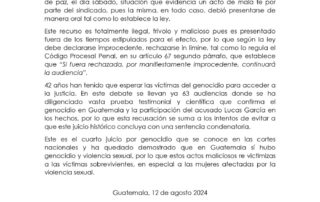Sepur Zarco
On February 26, 2016, indigenous women from the community of Sepur Zarco made history when they and their legal team successfully prosecuted former Guatemalan military officials for sexual and domestic slavery. Based largely on the testimonies of 15 Q’eqchi’ survivors, a Guatemalan tribunal convicted two men—former Military Commissioner Heriberto Valdez Asig and former Colonel Esteelmer Francisco Reyes Girón—of crimes against humanity for sexual and domestic slavery carried out at a military recreation center in the 1980s.
While the defendants faced charges for other crimes committed in the same context, including the forced disappearance of several of the women’s husbands, the trial holds national significance as the first transitional justice case in Guatemala to firmly center the experiences and impacts of sexual and domestic violence against women during the internal armed conflict.
When I became strong enough to be able to say what I had to say, I told the whole truth. That was what gave me strength…The moment came that we had been waiting for, for so long – to see justice.
In-depth NISGUA reports

Q’eqchi’ women set a precedent in Guatemala with first-ever conviction for sexual and domestic slavery.

Report-back from the “Guatemalan Women Healing Towards Justice” tour, featuring Maudi Tzay from the Alliance to Break Silence and Impunity.
In the early 1980s, communities in the Polochic Valley in Guatemala challenged wealthy landowners for legal titles to their ancestral lands. Around the same time, Guatemalan dictatorships constructed several military bases around the region of Sepur Zarco with the support of the U.S. The base built in Sepur Zarco was designated a military recreation center, where troops would return after taking 15-day rotations patrolling the surrounding mountains.
The soldiers at the Sepur Zarco military base disappeared men from the community who were seeking land titles, demonstrating the powerful connections between wealthy elites and the military. The women that survived them were then forced into sexual and domestic slavery for years. The trial illustrated how patriarchy and racism play out on women’s bodies in war. Grounded in the recognition that these systems endure today in Guatemala and the world over, the women survivors prosecuted this case as part of a multi-faceted strategy for social change. To do so they worked with a coalition of feminist, legal, and psychosocial organizations known as the Alliance to Break Silence and End Impunity.

Photo: CPR Urbana
The intergenerational struggle for access to and protection of land
After the verdict, the courts ordered 18 reparations to redress the physical, psychological, and material impacts of the violence. These include increased access to healthcare and education for survivors and community members, and legal reforms to reduce the barriers against survivors of sexual violence. The reparations focused on repairing harm, dissuading future violence, and community healing.
Survivors repeatedly testified to the psychological and economic impact of their husbands’ disappearances and how a lack of land access has perpetuated poverty. To carry out court ordered reparations, the Guatemalan national land registry must grant land titles and prioritize families of those forcibly disappeared while in the process of registering their land. Nonetheless, almost three years after the sentence, survivors have yet to receive titling.

In Solidarity
The Alliance to End Silence and Impunity called upon the international community to stand in solidarity with the women survivors of Sepur Zarco to ensure the legal system respects the sentence. The Alliance made direct requests for accompaniment, reporting, and advocacy to broaden the social impact of the case on a global scale.
Members of NISGUA responded to this call by gathering together to educate themselves and express solidarity with the survivors. We strengthened movements in Guatemala and the U.S. by drawing direct connections with local feminist struggles for gender justice and indigenous solidarity.
Latest from our blog
Press Release: Post-defeat of an attempt by the accused ex-general Lucas Garcia to dismiss the Ixil Genocide case, Maya Ixil elders prepare to give their testimony in Nebaj, Guatemala next week
August 15, 2024 FOR IMMEDIATE RELEASE Media Contact: Michelle Liang, International Accompanier, NISGUA internacionalista@nisgua.org | +502 4873 4422 Guatemala City, Guatemala - On Monday August 12, 2024, the defense lawyers of ex-general Manuel Benedícto Lucas [...]
Statement: Malicious Attempt at Dismissal in the Genocide Case
On Saturday, August 10, the defense of former general Benedicto Lucas García filed a legal action to recuse the court, since according to the lawyers the court allowed the Public Prosecutor's Office to overreach [...]
Actualización del caso Genocidio Ixil. Del 22 al 25 de julio de 2024
Lunes 22 de julio, Audiencia 52 Este día se continuó la escucha de la declaración en anticipo de prueba de la testiga María Marcos. La testigo señaló que cuando los soldados quemaron su casa [...]
Ixil Genocide Case Update. July 22-25, 2024
Monday, July 22, Hearing 52 This day the hearing continued with the testimony of the witness María Marcos. The witness pointed out that when the soldiers burned her house in Pexla, she was with [...]
Over a hundred people celebrate ADH’s 18th anniversary in Aguacatán, Huehuetenango
On July 26, 2024, over a hundred people joined the Departmental Assembly of the People of Huehuetenango in Defense of Territory and for the Autonomy and Free Determination of the People -ADH- in celebrating [...]
Más de Cien Personas Celebran el 18º aniversario de ADH en Aguacatán, Huehuetenango
En 26 de Julio, 2024, más que cien personas se unieron a La Asamblea Departmental de los Pueblos de Huehuetenango en Defensa del Territorio y por la Autonomía y Libre Determinación de los Pueblos [...]











